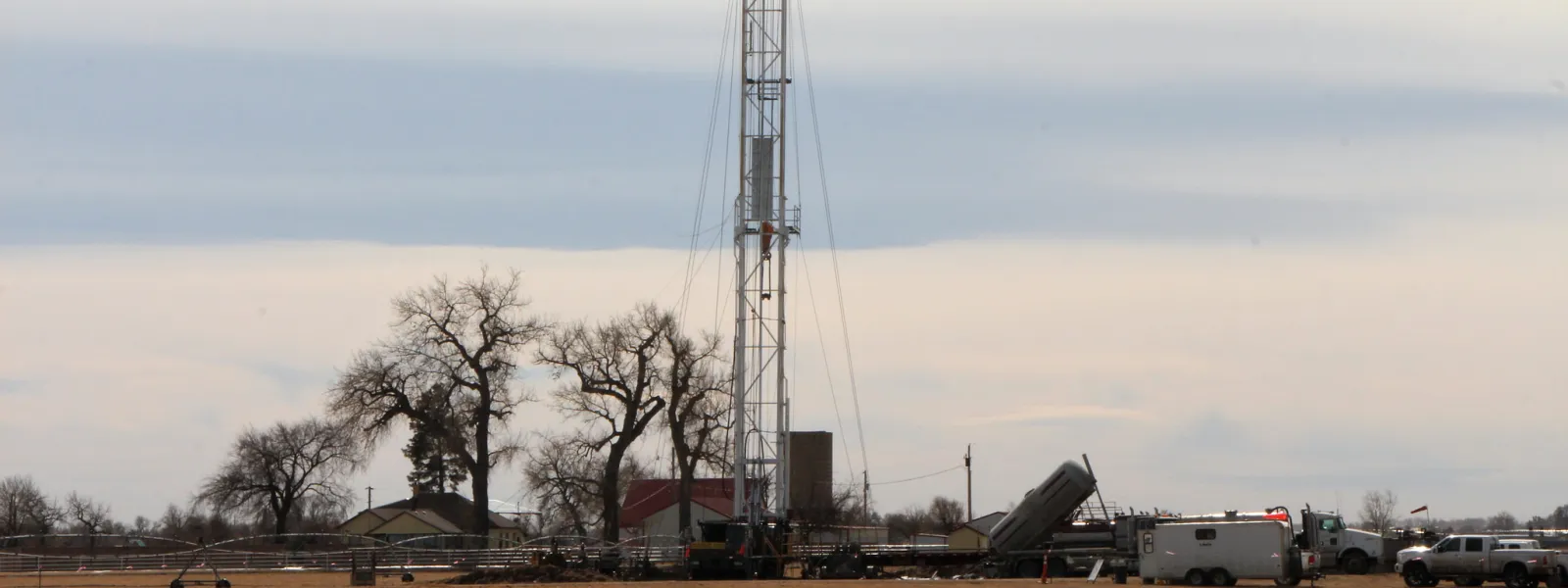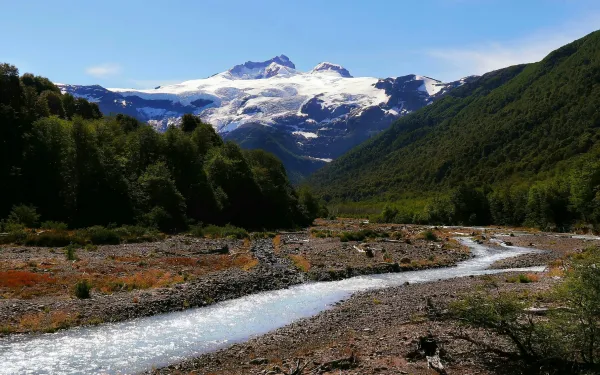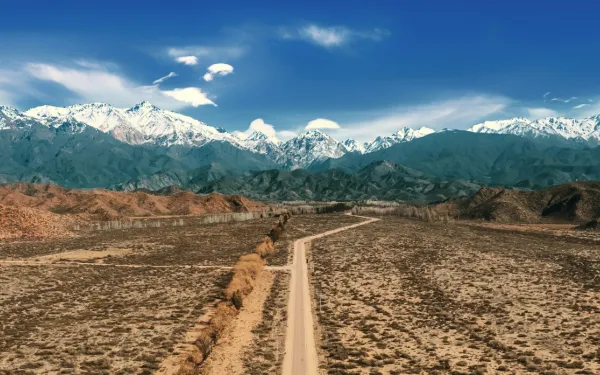
Project
Foto: Andrés ÁngelStopping the spread of fracking in Latin America
“Fracking” is short for hydraulic fracturing, a process used to extract oil and natural gas from historically inaccessible reservoirs.
Fracking is already widespread in the global North, but in Latin America, it is just beginning. Governments are opening their doors to fracking without understanding its impacts and risks, and without consulting affected communities. Many communities are organizing to prevent or stop the impacts of fracking, which affect their fundamental human rights. But in many cases they require legal and technical support.
What exactly is fracking, and what are its impacts?
A straight hole is drilled deep into the earth. Then the drill curves and bores horizontally, making an L-shaped hole. Fracking fluid—a mixture of water, chemicals, and sand—is pumped into the hole at high pressure, fracturing layers of shale rock above and below the hole. Gas or oil trapped in the rock rises to the surface along with the fracking fluid.
The chemical soup—now also contaminated with heavy metals and even radioactive elements from underground—is frequently dumped into unlined ponds. It may seep into aquifers and overflow into streams, poisoning water sources for people, agriculture, and livestock. Gas may also seep from fractured rock or from the well into aquifers; as a result, water flowing from household taps can be lit on fire. Other documented harms include exhausted freshwater supplies (for all that fracking fluid), air pollution from drill and pump rigs, large methane emissions that aggravate global warming, earthquakes, and health harms including cancer and birth defects.
AIDA’s report on fracking (available in Spanish) analyzes the viability of applying the precautionary principle as an institutional tool to prevent, avoid or stop hydraulic fracturing operations in Latin America.
Partners:

Related projects
Latest News

Mapuche defend against extractive industry and forced evictions from ancestral lands in Argentina
Mapuche communities urge Inter-American Commission on Human Rights to further investigate abuses at nexus of extractive industry and land dispossession.Río Negro, Neuquén, Mendoza, Argentina - Organizations of the Indigenous Mapuche People addressed the urgent situation arising from conflicts with extractive projects on Indigenous land in Argentina in a public hearing before the Inter-American Commission on Human Rights today. The human rights body of the Organization of American States heard testimony of those impacted by mining, oil, and gas projects that have been compounded by the lack of territorial recognition, ongoing evictions, and the criminalization of indigenous communities."The rapid expansion of extractive projects across ancestral Mapuche territories in Argentina is driving the eviction of our communities as projects proceed without their free, prior, and informed consent," emphasized Mirta Ñancunao y Hugo Aranea, werken (spokespeople) of the Mapuche-Tehuelche Parliament of Río Negro. This includes new mining projects across 1,800 square kilometers in Malargüe, oil and gas developments stretching 600 kilometers along the Vaca Muerta shale formation in Neuquén, and at least 53 new mining and energy projects in Río Negro, particularly in the Calcatreu open-pit gold and silver mining project, which threatens nearby water sources."The exploitation of natural resources has been accompanied by the intention to vacate traditional territories," said Lorena Bravo of the Mapuche Federation of Neuquen, Xaunko Regional Council. "The evictions have direct consequences including preventing the use of and access to land, sacred sites, impacts to health, access to water, impacting indigenous economies and traditional practices."Gabriel Jofré, werken of the Malalweche Organization, asserted that the "advance of extractive companies into the traditional territory of Mapuche communities is predicated on the lack of effective state recognition of Mapuche communities." He emphasized that the state has dismantled the processes used by Mapuche communities to assert their territorial rights, including the recognition of their legal status. Jofré also noted that the national government rolled back protections in Law 26.160, which had suspended evictions of recognized indigenous communities."The advance of land extraction is not possible without installing a racist and discriminatory discourse," which Jofre maintains endangers human rights and environmental defenders. Both national and provincial politicians have fueled racist and hateful discourses against Mapuche communities, labeling them "terrorists" and denying their Indigenous identities. This rhetoric has further stigmatized Indigenous defenders and increased the risks they face for engaging in rights advocacy.The communities urged the Commission to further investigate human rights violations occurring at the intersection of extractive industry expansion and the dispossession of Mapuche communities from their ancestral lands. In December 2024, the Commission issued a public statement calling on Argentina to respect the land rights of Indigenous Peoples.Organizations participating in the hearing included the Malalweche Organization from Mendoza, The Mapuche Confederation of Neuquén, and the Coordination of Mapuche Parlement of Río Negro, with support from the Observatory on the Human Rights of Indigenous Peoples, and the Interamerican Association for Environmental Defense. Earthjustice has partnered with the Malalweche Organization in defending territorial rights of the Mapuche people since 2022.Entre las organizaciones que participaron en la audiencia se encuentran la Organización Malalweche de Mendoza, la Confederación Mapuche de Neuquén y la Coordinadora del Parlamento Mapuche de Río Negro, con el apoyo del Observatorio de Derechos Humanos de Pueblos Indígenas, la Asamblea Permanente por los Derechos Humanos (APDH), la Asociación Interamericana para la Defensa del Ambiente (AIDA) y Earthjustice.Press contactVíctor Quintanilla (Mexico), AIDA, [email protected], +52 5570522107
Read more
The international search for justice of the Mapuche communities in Mendoza, Argentina
In the context of a global climate crisis that has deepened existing inequalities in Latin America, Mapuche communities in Mendoza, Argentina, face multiple threats that increase their vulnerability to climate change and violate their rights.One of these activities is hydraulic fracturing, or fracking, a method of extracting hydrocarbons widely associated with socio-environmental impacts. In Argentina, it is widely used in the Vaca Muerta mega-development, which covers an area of about 30,000 square kilometers and is considered the second largest gas deposit and the fourth largest unconventional oil deposit in the world.A significant portion of Vaca Muerta is in Mendoza Province. The megaproject covers 8,700 square kilometers. Here, Mapuche communities also face a complex political environment that is threatening their territorial rights and even their identity. Added to this are national policies that are detrimental to indigenous rights in the country. These policies aim to dispossess the communities and make it easier to carry out fracking and other extractive activities.Faced with this situation, the Mapuche people are not willing to give up in the defense of their rights, their way of life and their territorial integrity.The Malalweche Territorial Identity Organization, which represents more than 20 Mapuche communities in the province of Mendoza, has appealed to various international organizations to denounce and publicize the critical situation and to demand justice.This process of international denunciation includes communications to the UN Special Rapporteurs on the Rights of Indigenous Peoples and on the Environment and Human Rights, and the submission of an amicus curiae brief to the Inter-American Court of Human Rights on climate emergency and human rights. Fracking's many impactsOil and gas extraction through fracking in Vaca Muerta takes place on the ancestral lands of the Mapuche people. Fracking is an extreme extraction technique that has significant environmental impacts, including increased greenhouse gas emissions. In the provinces of Neuquén and Río Negro, where the exploitation of Vaca Muerta is most widespread, serious environmental and human damage has been occurring for more than a decade and continues to increase.For Mapuche communities, the impact of fracking goes beyond physical damage to the environment. Extractive activities in their territories undermine their capacity for self-determination and profoundly affect their psychological and spiritual well-being, as their relationship with the land is fundamental to their identity and culture.Although fracking in Mendoza is in its infancy, with only a few active wells, the companies and the province have plans to expand it, in addition to the continued growth of activity throughout Vaca Muerta. In order to do this, they will need larger areas of land and the availability of large amounts of water. In this context, traditional practices such as transhumance – a type of seasonal migration in which shepherds move their animals between pastures at different times of the year – are seriously threatened.The growth of these activities, in the current context of water and climate crises in the region, increases the vulnerability of these communities and compromises their ability to continue living sustainably in their natural environment. Reduced human rights safeguardsThe strategy of expanding the occupation of Mapuche lands with mining and other extractive activities has led to the adoption of retrogressive policies that are undermining the framework for the protection of the rights of the Mapuche people in Mendoza and throughout the country.One of these is the declaration approved in March 2023 by the Chamber of Deputies of Mendoza, which questions the status of the Mapuche as an indigenous people of Argentina. This has raised concerns about the possibility of recognizing their territorial rights and the increase in evictions they are already suffering.Complementary measures that facilitate the development of extractive activities over the human rights of indigenous peoples are also being promoted at the national level. These include the closure by decree of the National Institute against Discrimination, Xenophobia and Racism, whose mission was to promote policies and actions aimed at achieving a society free of discrimination. This measure weakens the institutional protection of human rights.Similarly, the government announced the closure of the National Institute of Indigenous Affairs, dedicated to the promotion and defense of indigenous rights. Although this measure has not been carried out, its functional autonomy has been abolished and the areas dedicated to the recognition of communities and the regularization of their territories have been eliminated. In practice, these measures prevent these peoples from exercising their constitutional right to their ancestral lands.In addition, Law 26160, which had suspended the evictions of indigenous peoples while their territorial regularization was in process, has also been repealed. The Secretary of National Security, Patricia Bullrich, argued that there cannot be permanent laws preventing evictions, since "there cannot be a right to usurp.” Violent evictions against indigenous communities have already begun. Actions of international defenseIn response, the Mapuche communities of Mendoza have shown an enormous capacity for organization and resistance.They have turned to international bodies to expose their situation and demand concrete action from local and national authorities. A key example is the communications sent to the UN Rapporteurs on Indigenous Peoples and on Environment and Human Rights to denounce political persecution and violations of their territorial rights. These communications highlight the complacency of the authorities towards extractive interests. The focus of these denunciations has been the defense of their rights in the face of the advance of fracking and other extractive activities.Additionally, the communities were part of the advisory opinion process through which the Inter-American Court of Human Rights will clarify the continent's states' obligations to protect human rights in the face of the climate crisis.The Malalweche Organization submitted an amicus curiae brief, and its representative testified at a public hearing before the International Court of Justice to demonstrate that the extraction of hydrocarbons through fracking and metalliferous mining in their territories reduces their capacity to resist the climate crisis and exacerbates the severe water scarcity in the area, threatening their very survival.The Mapuche communities of Mendoza also presented concrete proposals for action. They called for their inclusion in all consultation and decision-making processes that affect their territories, in accordance with Convention 169 of the International Labor Organization. They stressed the importance of including their traditional wisdom in the development of public policies that benefit indigenous communities and contribute to more effective and sustainable solutions to global environmental challenges.They also called for the intervention of multilateral organizations to demand that the Argentine state guarantee free, prior and informed consultation and strengthen the national institutions responsible for protecting the rights of indigenous peoples.Supported by organizations that defend human rights and the environment, these struggles aim not only to protect the ancestral territories of the Mapuche, but also to guarantee their right to live in peace, with dignity, and in harmony with their natural environment. Their goal is to ensure the self-determination of indigenous peoples. This will allow them to manage their lands and resources in accordance with their worldview, which is deeply linked to conservation.Recognition of the rights of Mapuche communities, including the cessation of extractive activities such as fracking in their territories, is essential to protect their culture, health and livelihoods. With their ancestral wisdom, they offer a way to effectively address the climate crisis and build a more just and sustainable future.
Read more
Organizations concerned by Mendoza Supreme Court rejecting their Participation while allowing that of the oil industry in litigation over fracking
The Mendoza Supreme Court’s differential treatment occurred in a lawsuit over the authorization of fracking, or hydraulic fracturing, for extracting oil and gas from the Vaca Muerta formation in the Argentinian province. Civil society groups express concern about the Mendoza Supreme Court’s refusal to receive information about the dangerous impacts of using fracking to extract oil and gas on indigenous peoples and the environment in Mendoza. The Court rejected the participation of seven organizations--including an organization of the Mapuche Indigenous People and both Argentinian and international groups on human rights and the environment--in a case that will impact the regulation of the oil and gas industry in Mendoza.The court has instead shown preference toward the fossil fuel industry, having allowed the participation of several groups representing the interests of oil companies in the same court case.The court is weighing a decision involving the authorization of hydraulic fracturing--also known as fracking--to extract oil and gas from the Vaca Muerta formation in Mendoza. Although fracking has not been widely used in Mendoza, the technique has caused public health and safety risks in other countries because of its impact on the environment.The organizations requested to participate in the case as "Friends of the Court" (amicus curiae). This is a common practice permitted in Mendoza and many countries around the world that allows people not otherwise connected with litigation to share information with the courts in cases that affect the public interest.One justice dissented from the Supreme Court's decision, criticizing that this ruling "is far from the level of listening that ought to demand the judge's attention in the resolution of cases of undoubted social interest, such as the one at issue here." Furthermore, the justice pointed out that "[t]he entities requesting this Court to grant them participation as amicus, have vast experience and specialization in environmental issues."So far, the Supreme Court has rejected the interventions of the following organizations: Organización Identidad Territorial Malalweche (Mendoza); Xumek (Mendoza); Centro de Estudios Legales y Sociales (national); the Interamerican Association for Environmental Defense (international), the Center for International Environmental Law (international); Earthjustice (international) and the Environmental Law Alliance Worldwide (international). Statements from the organizations Ana Laura Piccolo, executive director of XUMEK:"At Xumek, we are concerned by the provincial Supreme Court’s repeated rejections of the participation of civil society organizations through the figure of the 'Friend of the Court.' The organizations that have come forward to collaborate have established experience in the subject matter of the case and we make our contributions from a serious and objective perspective, in accordance with the technical and legal knowledge and expertise we possess. In addition, we have participated as amicus curiae in numerous judicial proceedings, both local and international". Ñushpi Quilla Mayhuay Alancay, attorney in charge of the Indigenous Peoples Area of XUMEK:"As expressed in the dissenting vote, ignoring all the voices of civil society in a case of high social complexity affects the dialogue between the judiciary and the citizens, thereby weakening the democratic process in cases of social interest where the human rights of society can be affected". Erika Schmidhuber, attorney with the Center for Legal and Social Studies (CELS):"We consider it essential that the province complies with international human rights standards on free, prior and informed consultation with indigenous peoples for development projects in their ancestral territory, regardless of whether or not that territory is formally recognized. The Argentine State has already been condemned internationally for not complying with these standards. It is necessary for the Mendoza court to evaluate the arguments we have presented as they reflect the obligations that Mendoza must comply with." Jacob Kopas, attorney at Earthjustice:"Strong scientific evidence from other countries shows that fracking generates serious contamination risks, particularly by leeching toxic chemicals into nearby water supplies. It is essential that the Supreme Court of Mendoza take this evidence into consideration along with the support for fracking it has received from groups that profit from oil extraction." Sofía Barquero, attorney with AIDA's Ecosystems Program:"Our interest in this case stems from our desire to ensure that environmental protection and the rights of indigenous peoples are an integral part of any decision that may affect these communities. In that sense, we respectfully call on the Court to reconsider its decision and allow for the inclusion of civil society voices in this judicial process. We trust that the Court will take into consideration the importance of listening to all stakeholders in this case." Upasana Khatri, attorney at the Center for International Environmental Law (CIEL):"Fracking poses long-term environmental and health hazards that outlast production. It is essential that the Court hears from civil society experts on the evidence of such harms and the legal duty to prevent them - not just from industry actors with a stake in fossil fuel production - to ensure an informed decision on the risks and regulation of fracking in Mendoza."Press contactsOrganización Identidad Territorial Malalweche, Werken Gabriel Jofre, +54 2604592679XUMEK Asociación para la promoción y protección de los derechos humanos, Ñushpi Quilla Mayhuay Alancay, +54 9 2616807798CELS, Martina Noailles, [email protected], +54 9 11 6562-6566AIDA, Víctor Quintanilla, [email protected], +521 5570522107Earthjustice, Jacob Kopas, [email protected], +1 5862924603CIEL, Press Office, [email protected]
Read more